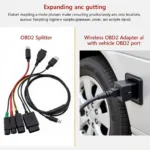Timing advance is a crucial aspect of your Dodge 4.7 engine’s performance. It determines when the spark plugs ignite the air-fuel mixture in the combustion chamber, directly impacting your engine’s power, fuel efficiency, and overall health. An OBD2 scanner can provide valuable insights into your engine’s timing advance, allowing you to diagnose potential issues and ensure optimal performance.
What Does Timing Advance Mean?
In simple terms, timing advance refers to how early or late the spark plug fires in relation to the piston’s position in the cylinder. When the timing is advanced, the spark plug fires earlier, giving the air-fuel mixture more time to burn completely. This results in increased power and efficiency. Conversely, retarded timing means the spark plug fires later, potentially leading to decreased performance and increased emissions.
How to Read Timing Advance on an OBD2 Scanner
Most OBD2 scanners display timing advance in degrees before top dead center (BTDC). A positive value indicates the spark is firing before the piston reaches the top of its stroke, while a negative value suggests the spark is firing after the piston has passed top dead center.
For a Dodge 4.7 engine, the ideal timing advance can vary depending on factors like engine load, RPM, and operating temperature. However, a typical range for a healthy engine at idle is between 8 and 15 degrees BTDC.
Common Causes of Abnormal Timing Advance Readings
Several factors can contribute to abnormal timing advance readings in your Dodge 4.7 engine. These include:
- Faulty Crankshaft Position Sensor: This sensor plays a vital role in determining the engine’s position and speed, directly influencing timing advance calculations.
- Worn Timing Chain or Belt: Over time, the timing chain or belt can stretch or wear, affecting the synchronization between the crankshaft and camshaft, leading to inaccurate timing.
- Vacuum Leaks: Leaks in the engine’s vacuum system can disrupt airflow sensors, affecting the air-fuel mixture and ultimately impacting timing advance.
- Faulty Knock Sensor: The knock sensor detects engine knocking or detonation and adjusts timing to prevent damage. A malfunctioning sensor can lead to inaccurate timing adjustments.
- ECU Issues: Problems with the Engine Control Unit (ECU), which manages engine functions including timing, can result in incorrect timing advance readings.
Troubleshooting Timing Advance Issues
If your OBD2 scanner reveals abnormal timing advance readings, it’s essential to diagnose the root cause promptly. Here are some steps you can take:
- Check for Error Codes: Begin by scanning for OBD2 error codes related to the timing system or sensors mentioned above.
- Inspect Vacuum Lines: Visually inspect all vacuum lines connected to the intake manifold and related components for any signs of cracks, leaks, or loose connections.
- Test Sensors: Use a multimeter to test the functionality of the crankshaft position sensor, knock sensor, and other relevant sensors according to manufacturer specifications.
- Inspect Timing Components: If possible, visually inspect the timing chain or belt for signs of wear, stretching, or damage.
Conclusion
Understanding your Dodge 4.7 engine’s timing advance is crucial for maintaining optimal performance and fuel efficiency. An OBD2 scanner provides an accessible way to monitor this vital parameter and identify potential issues early on. If you encounter abnormal readings, don’t hesitate to consult a qualified mechanic for further diagnosis and repair.
Need further assistance with your Dodge 4.7 engine or have questions about OBD2 scanner readings? Contact our expert team via WhatsApp: +1(641)206-8880, or Email: [email protected]. We offer 24/7 support to help you get back on the road.


